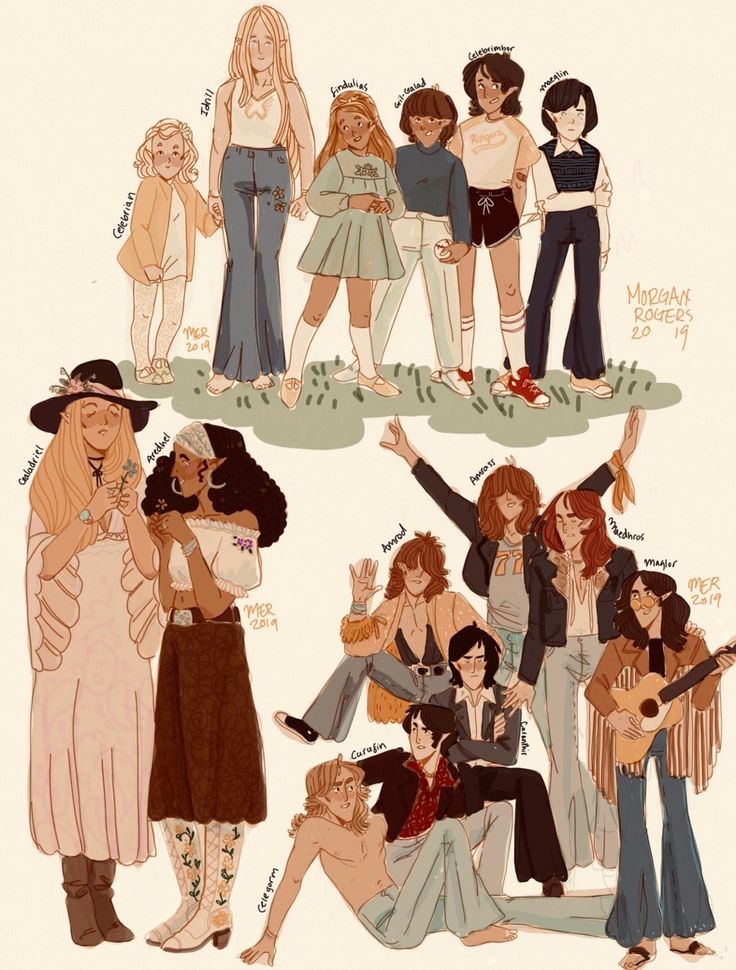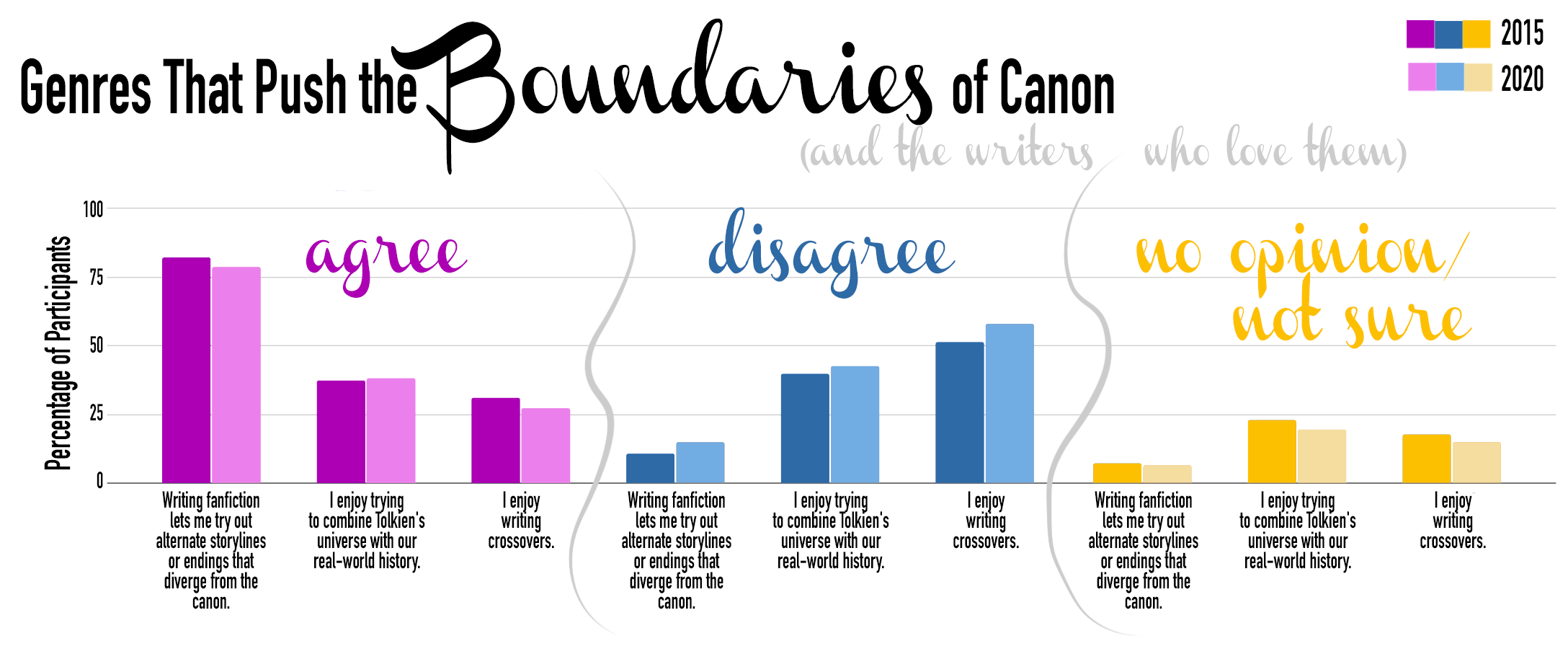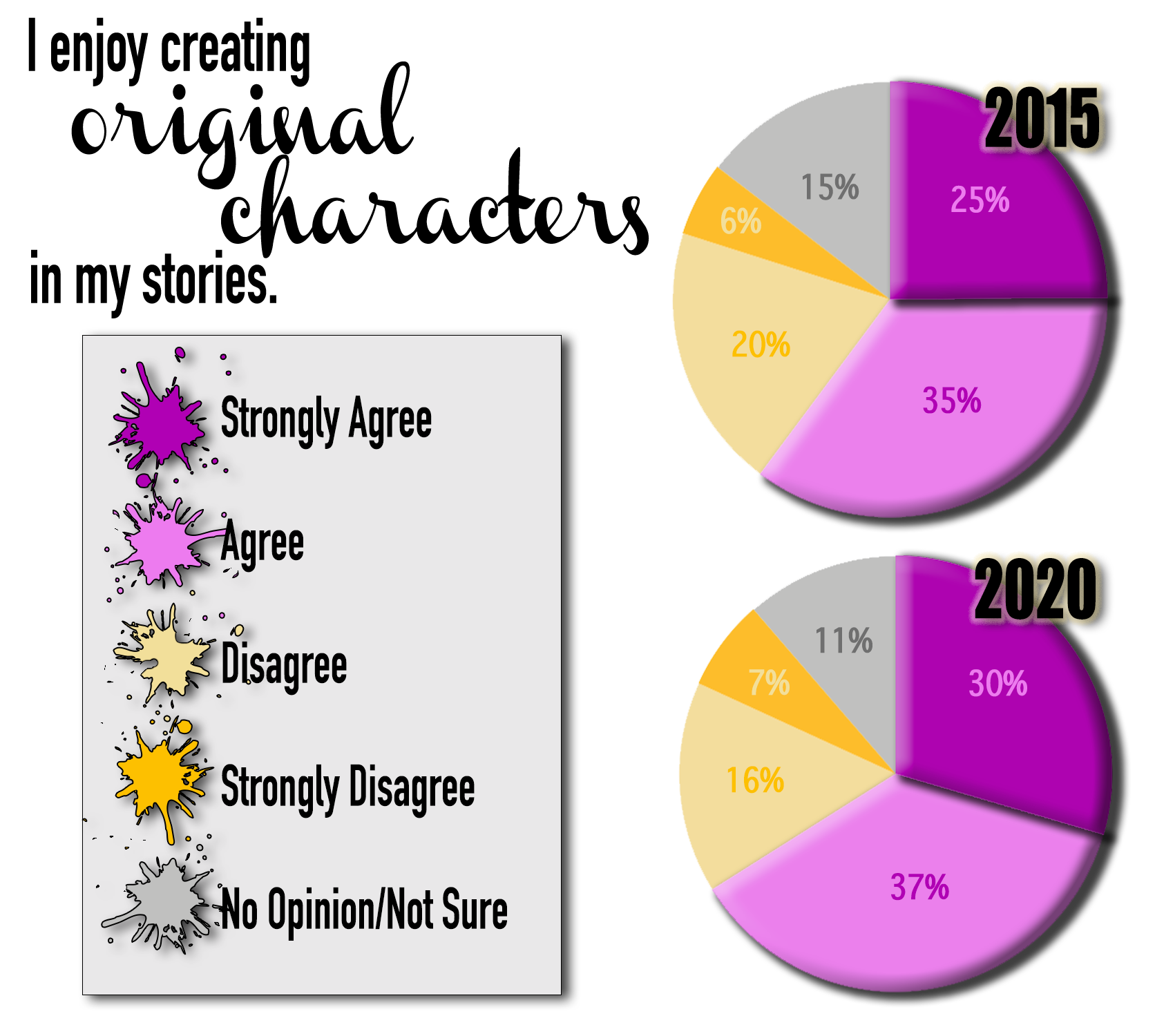Beyond Borders: Canon Deviations, Multifandoms, and Original Content by Dawn Walls-Thumma
Posted on 30 March 2024; updated on 31 March 2024
This article is part of the newsletter column Cultus Dispatches.

Early in the history of online fandom, fanfiction was a byword. This was when I started writing fanfiction, and I remember very well the sense of shame that many writers (and readers) felt surrounding their hobby. The average person, of course, did not have any inkling that fanfiction existed. This was also the days of legal fears around writing or posting fanfiction, when authors often guarded their identities like state secrets, lest they be sued or outed to their "RL" (real-life) communities and employers. That was a thing too: that your boss might find out that you wrote fanfiction and you might be fired.
Concomitant with this, many writers presented fanfiction as a stepping stone or training tool for original fiction. When, every few months it seemed, a major author would blog a screed about how much fanfiction and fanfiction writers sucked, one of the key defenses was the preparation fanfiction provided for its practitioners to eventually write original fiction. According to this idea, fanfiction was like riding a bike with training wheels: getting to practice the craft without having to balance the trickier elements of characterization and worldbuilding. When I first began posting my writing, I mentioned my few (very minor) short story publications and editorial posts. In a fandom that felt quite scary, it bought me instant cred, and my fellow writers were very interested in how I'd managed it. Never mind that my fanfiction stories had many times the readers than my original work; the work was original and it was published, and that elevated it.
Today, I look back on these views as misguided but ultimately borne of desperation: the urge to confer legitimacy upon an activity that is loved and was nearly universally mocked. But, as I consider over the next few months the various ways that Tolkien fanfiction writers express themselves fannishly and creatively outside of fanfiction, the question remains: To what extent do Tolkien fanfiction writers range beyond that to pursue other types of writing? What trends exist—in other words, can we predict, based on the kinds of fanfiction a person writes, if they will also write original fiction? Using Tolkien Fanfiction Survey data from 2015 and 2020, I'm going to look not just at original fiction-writing but writing for other fandoms, crossovers, and alternate universe storylines.
I ran the Tolkien Fanfiction Survey in 2015 and 2020, the latter in collaboration with Maria K. Alberto, with 1,052 and 746 valid responses, respectively. Participants were asked about demographic data, fandom preferences (such as archives used and other fandoms they read and wrote for) and a series of (mostly) Likert-style items about beliefs and practices within the Tolkien fanfiction fandom. These items generally gave five choices: Strongly Agree, Agree, Disagree, Strongly Disagree, and No Opinion/Not Sure. When I say that "participants agreed," I am combining the data for Strongly Agree and Agree. (Same when "participants disagreed.") And, as always, I urge caution when using this data. While survey data is interesting, it is but one way to look at a very limited sample of fanfiction readers and writers, and being able to measure something doesn't make it better or stronger evidence than other ways of gathering information about fandom and fan cultures. In fact, survey data has a lot of weaknesses, given that it will always overrepresent some fan demographics and communities and underrepresent (or entirely exclude) others. Ideally, the data here is used in conjunction with other forms of evidence.
Pushing the Boundaries of Canon
Certain genres of fanfiction suggest pushing beyond the world that Tolkien gave us and begin to verge into creating original content. Three survey items looked at specific types of stories that did this:
- Writing fanfiction lets me try out alternate storylines or endings that diverge from the canon.
- I enjoy trying to combine Tolkien's universe with our real-world history.
- I enjoy writing crossovers (stories that combine Tolkien's world with the fictional world of another author).
Between the 2015 and 2020 surveys, these data did not change significantly. The number of participants who agreed with the three statements didn't show any trends in how they changed from 2015 to 2020. Participants who disagreed did, on the other hand. In 2020, participants tended to disagree more often with the boundary-pushing statements than they did in 2015, and the difference between the data for the two years was greater.

No Opinion/Not Sure data decreased across all items from 2015 to 2020. This is something I've noticed before. Here, recalling the contexts of the two survey years is likely useful. 2015 was the tail end of the Hobbit films, which attracted many new Tolkien fans, including fanfiction writers. 2020, on the other hand, was a media lull. The fandom was more mature in 2020, and participants were more likely to have been writing long enough to form an opinion on the survey items.
In all, by 2020, fewer fanfiction writers enjoyed the types of writing that pushed the boundaries of canon. Why is this? It may be an effect of the Hobbit films and of a higher number of writers, in 2015, whose specific enjoyment and use of those films led them to play faster and looser with the canon than their mostly bookverse peers five years later.
Otherworldly: Multifandom Participation
Tolkien fanfiction writers are much more monofandom than fanfiction writers as a whole.
The stereotypical fanfiction writer dabbles among fandoms like a bee in a field of flowers. The experience of creating fanfiction, as popularly described, is a short-lived and intense engagement with a particular fandom before moving on to others. Sometimes this is due to interest in the original text: watching a show, seeing a movie, reading a book, or playing a game that invites fanfiction. Some authors, however, describe becoming interested in a fandom due to seeing other fans interested in it and sometimes after reading or viewing fanworks about it. Fandoms, likewise, flare and fade like shooting stars: suddenly there, suddenly gone.
Tolkien fanfiction writers are less likely to be this way.
About one in four Tolkien fanfiction writers are monofandom, and this was almost perfectly unchanged between 2015 and 2020 (23.5% in 2015 and 23.0% in 2020). As I feel like I write every time I analyze survey data, two years do not a pattern make, but the consistency here—despite the major Tolkien fandom cultural shift represented by the Hobbit films in 2012-14—is still intriguing.
In comparison, in CentrumLumina's 2013 AO3 Census, only about 13% of participants were monofandom.1
Returning to the data in the section above, authors were more likely to agree that they wrote alternate universe (AU) fanfiction than crossovers, "stories that combine Tolkien's world with the fictional world of another author." Again, this suggests Tolkien fanfiction writers' allergy to other fandoms. While not averse to bending the canon, authors prefer to do that on their own terms rather than drawing in canons forged by other creators.
Both surveys also asked, "If you write fanfiction for other fandoms, would you define the Tolkien fandom as your primary fandom?" These data also remained relatively unchanged between the two surveys: 53% and 51% answered "Yes" in 2015 and 2020 respectively. The 2020 survey added a question: "Was Tolkien-based fanfiction the first kind of fanfiction that you wrote?" For the 38% of participants, it was.
Of course, the flip side of that is that about two in three participants wrote for another fandom before Tolkien, and half of authors don't consider Tolkien their primary fandom. But given the hundreds (thousands?) of fandoms that are actively generating fanworks at any given moment, the high commitment to specifically the Tolkien fandom by a not-insignificant number of fanfiction authors is notable and possibly explains why Tolkien fanfiction authors are less likely to branch out into other fandoms than fanfiction writers overall.
My People: Original Characters
 To this point, we've been pushing the boundaries of the Tolkien canon and fandom, but original characters (as the name suggests!) begin to edge into original content. Original characters are especially interesting because, in the anti-fanfic screeds of the 2000s, "bUt mY ChArAcTeRs!!!" was the substance of many of them, and fanfiction was proclaimed inferior due to the writer's apparent inability to craft their own characters.2 Original characters, of course, challenge both of those positions and ultimately show fanfiction to be a genre that can be flexible, inventive, and transformative (just as "original" writing can be derivative and stale).
To this point, we've been pushing the boundaries of the Tolkien canon and fandom, but original characters (as the name suggests!) begin to edge into original content. Original characters are especially interesting because, in the anti-fanfic screeds of the 2000s, "bUt mY ChArAcTeRs!!!" was the substance of many of them, and fanfiction was proclaimed inferior due to the writer's apparent inability to craft their own characters.2 Original characters, of course, challenge both of those positions and ultimately show fanfiction to be a genre that can be flexible, inventive, and transformative (just as "original" writing can be derivative and stale).
As the graph to the left shows, most Tolkien fanfiction writers do in fact craft original characters for their stories (and in fact "enjoy" it, per the wording of the question). Furthermore, this number grew from 2015 to 2020, from 60% to 67% agreeing with the statement.
The growing interest in OCs might be explained by another 2000s-era trend: a tendency, at least in the Tolkien fanfiction fandom, to dislike original female characters or OFCs. In November 2022, Fandom Voices: Women in Fanworks collected many fan recollections of this phenomenon, as well as the intentional effort by fans to not just destigmatize but celebrate writing about women in Tolkien's world. Similar efforts have been undertaken for queer characters, characters of color, neurodivergent characters, characters with disabilities, and other marginalized groups. It is possible that the growing interest in OCs between 2015 and 2020 represents the ongoing success of those efforts and the normalization of filling in the lack of demographics other than "straight white able-bodied male" in the legendarium with original characters.
All By Myself: Original Fiction
And ultimately, the interest in original characters is not surprising because, according to the 2020 survey, 68% of Tolkien fanfiction authors also write original fiction. (The question, "I write original fiction as well as fanfiction," was not asked in the 2015 survey.)
Here, I want to be absolutely clear that I do not view original fiction as the actualization of a writer's full potential or the ideal goal of writing fanfiction. In fact, as I've written before, fanfiction is fiction, and most fiction contains both derivative and transformative elements, and labeling something as "fanfiction" seems as much to do with who is writing it (and when, since much ancient and medieval work was openly derivative, yet we don't call it "fanfiction") as the degree to which it borrows from other texts.
Yet the fact remains that two out of three authors who participated in the 2020 survey wrote original fiction.
 Both the 2015 and 2020 surveys also included the item, "Writing fanfiction has encouraged me to write original fiction." The 2020 data are shown to the right.3
Both the 2015 and 2020 surveys also included the item, "Writing fanfiction has encouraged me to write original fiction." The 2020 data are shown to the right.3
These data show that fanfiction certainly encourages the creation of original works, but not all authors who create original stories connect that process with the creation of fanfiction. While 68% of participants write original fiction, only 52% agreed with the statement about fanfiction encouraging original fiction.
I was curious if writers of original fiction were more likely to push past Tolkien's established world in other ways as well, so I ran the data again for the survey items discussed above, this time only including participants who answered "Yes" to the statement, "I write original fiction as well as fanfiction." The data for writers of original fiction are as follows:
- "Writing fanfiction lets me try out alternate storylines or endings that diverge from the canon": 80% agreed (compared to 79% of all participating authors).
- "I enjoy trying to combine Tolkien's universe with our real-world history": 38% agree (compared to 38% of all participating authors).
- "I enjoy writing crossovers (stories that combine Tolkien's world with the fictional world of another author)": 29% agreed (compared to 27% of all participating authors).
- "Do you write fanfiction for other fandoms?" 18% answered "No" (compared to 23% of all participating authors).
- "If you write fanfiction for other fandoms, would you define the Tolkien fandom as your primary fandom?": 51% answered "Yes" (compared to 51% of all participating authors).
- "Was Tolkien-based fanfiction the first kind of fanfiction that you wrote?" 38% answered "Yes" (compared to 38% of all participating authors).
- "I enjoy creating original characters in my fanfiction": 68% agreed (compared to 66% of all participating authors).
To summarize, there is little to no difference in how writers of original fiction responded to these items compared to authors overall. They are not more likely to push the boundaries of canon, enjoy creating original characters, or consider Tolkien fandom their primary fandom. They don't like crossovers or AU stories any more or less. The sole item where there was a possibly significant difference: writers of original fiction are more likely to be multifandom.
A lot more could be done with these data to reveal connections and correlations, including possible demographic trends. From this preliminary analysis, however, no clear "types" of writers emerge. Some writers also write original fiction, some create original characters in fanfic, some write crossovers, some write alternate universes. It doesn't seem that a preference for one predicts a preference for another; i.e., a willingness to bend canon doesn't predict that the author will dispense with consideration of canon altogether and turn to original fiction. Even creating original characters is unconnected to writing original fiction.
While anti-fanfic arguments are far less prevalent now than they were fifteen years ago, there is still a tendency in mainstream discussions of fanfiction to tether it to commercial fiction. Stephanie Meyer, for example, is almost always mentioned, as in, "Look! This writing can be publishable, popular, and profitable!" There is still an underlying message that, hey, fanfiction writers, look! You too can achieve the ultimate goal of publication. The idea that all writers aren't working toward the vaunted status of Published Author is rarely considered.
What data from the Tolkien Fanfiction Survey suggest instead is that writers … write. Lots of different things. Sometimes they write fanfiction, sometimes they blend universes, sometimes they break canon, sometimes they do their own thing. As much as some of the 2000s-era fantasists liked to believe that the fanfiction writers they loathed were stunted creatives, incapable of creating their own characters and worldbuilding, the data suggests anything but. To borrow from 2000s-era fanfiction lingo, writers go where the muses take them, and that can be all sorts of weird and wonderful places, unbound by reason.
Notes
- Personal communication.
- See, for example, these "rants" by Diana Galbadon (here, she compares fic about her characters to children being sold into "white slavery"), Robin Hobb, and George R.R. Martin.
- I've chosen not to include the 2015 data in the graph because the answer options in 2015 did not include the option "I do not write original fiction," which left those authors without a good choice. (They could have skipped the item, but it does not appear that most of them did, which means they are probably scattered amid the Strongly Disagree, Disagree, and No Opinion/Not Sure options, which makes the data for 2015 incomparable with the 2020 data. If you still want the 2015 data, with its issues in mind:
- Strongly Agree: 24%
- Agree: 35%
- Disagree: 20%
- Strongly Disagree: 4%
- No Opinion/Not Sure: 16%


Storytelling is storytelling
I'm tired of the misconception that published fiction is inherently better than fanfiction. I've read many fanfics that were of greater quality than original fiction (and oc fiction I'd consider good), not only Tolkien (specifically HoME and Silmarillion) fanfic where the bar is high, but other fandoms as well. Likewise, I've read many bad works of fiction that made me wonder if the editor did their job from their phone when using the loo.
The published fiction > fanfic attitude dismisses the long lasting storytelling traditions. I would find it hard to believe that the people who criticise fanfiction come from a culture that has no oral tradition whatsoever. Many versions can be found for one story/legend/myth, and each storyteller brings their own flavour, just like fanfiction does. This attitude is ridiculous and disrespectful of one's own culture.
On The Hobbit, I noticed that movie fanfics have a lot of AUs. Want to see an Achaemenid Empire AU? I'm sure The Hobbit has it. Startrek AU? I'm sure there's more than one option! People from the 00s would screech.
I'm surprised by the percentage of Tolkien fanfic writers that also write original fiction. I expected it to be slightly less. I wonder if there's a preferred platform for authors to post their original work? I've seen some on ao3, but I admit I don't actively look for original works (unless it's written by a fanfic author I like).
(Sorry this reply is coming…
(Sorry this reply is coming so late!)
My personal theory re: pUbLiShEd StUfF iS bEtTeR!!! (much less the even more odious "original work is better" ... I've edited for small-press publications and trust me, a lot of fiction sucks!) is that this is largely economic in motive. Right now, fan-created works that are available for free can meet most of a person's needs for reading and even other media forms and no one profits. It's much easier to cut off interest in those creations than to have to compete with them. Because dig even a millimeter beneath the surface and the idea that something is more enjoyable because it has legal rights for someone to profit on it is ridiculous.
Regarding original fiction, I'd be surprised if most fanfic writers are publishing it online. As someone who, these days, writes mostly original fiction, I do not post it online because it lacks a built-in audience. I did, for many years, post my original work under friend-lock to my LiveJournal, and most of it got few or no comments. So what was the point of going to the effort to post it? To post something publicly (on AO3 or FictionPress, for example) nullifies first rights to publish that work in a publication, and it's hard (for me) to decide that I never want to publish a work in a publication that obtains those rights, again for little/no positive attention to the work.
That might just be me, but that is my thinking as a writer of both!
And to that point ... thanks for reading and especially for commenting! :D
Yes, there are certainly…
Yes, there are certainly things that one can learn by writing fanfiction (and also things one can learn through engaging with Tolkien fanfiction, in particular) but I think the relation between fanfiction and original fiction and original elements in fanfiction is a lot more complex for writers now than any such over-simplified concept of fanfiction as a training ground and probably always was. (And also, of course, the idea that original fiction must always be aiming for publication is also an expectation that is sometimes imposed on writers by others, whether they truly want that themselves or not.)
Yes, fanfic is so…
Yes, fanfic is so complicated in ways that the "training wheels" approach fails to keep in mind! Am I creating a character from whole cloth and worldbuilding a whole new world? No. But I am more constrained in what I do, following not just the rules of a text but sometimes a fandom, and responding to that text (or fandom) in a way that better approximates scholarship than fiction-writing. I'd say a more accurate parallel is between fanfic and historical fiction, rather than the "training wheels" idea. Doing both, I spend much less time and worry before starting an original fic than a Tolkien fanfic, especially if I'm writing about an area of the legendarium that I am not as comfortable with!
I think it's very much a case of outsiders not seeing everything that goes into what can look just like a quick one-shot, before we even get into the artistic/literary quality of the work.